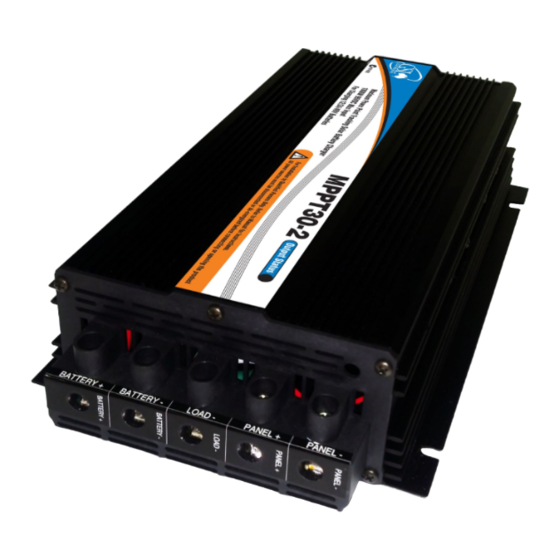Table of Contents
Advertisement
Quick Links
Model:
MPPT30-2
Page 1 of 8
This revolutionary maximum power point tracker solar charger was designed using the
technology that won GSL Electronics the prestigious EDN Innovation Awards 08' and 09'
and the Greentech Consensus Awards 09'. A simple, compact and low cost alternative.
Ideal for charging batteries with the new low cost and high efficiency grid type panels.
The MPPT 30-2 is designed to automatically charge 12V, 24V and 48V sealed and vented
lead acid batteries from silicon based PV panels such as monocrystalline, polycrystalline
and thin film. It has a built-in Load Low Voltage Disconnect configurable as a Dawn to Dusk
switch. It can be connected to the MCM for remote control and full system parameter logging
and display.
1700W Solar Battery Charger
Maximum Power Point Tracker
Please read these instructions before use
PATENT APPLIED FOR - 2010901565
Unit 2, 110 Station Road, Seven Hills ,NSW, 2147, Australia
Operating Instructions
MPPT30-2-R8
Advertisement
Table of Contents

Subscribe to Our Youtube Channel
Summary of Contents for GSL MPPT30-2
- Page 1 Please read these instructions before use This revolutionary maximum power point tracker solar charger was designed using the technology that won GSL Electronics the prestigious EDN Innovation Awards 08’ and 09’ and the Greentech Consensus Awards 09’. A simple, compact and low cost alternative.
- Page 2 • This equipment must be installed by qualified personnel only and incorrect wiring can cause fire, injury or death – GSL will accept no responsibility for MPPT misconnection or misuse. • Use only sealed or vented 12V, 24V or 48V lead acid batteries and confirm the MPPT settings, charge voltages and currents are correct for your battery system –...
- Page 3 Model: 1700W Solar Battery Charger MPPT30-2 Maximum Power Point Tracker Page 3 of 8 Operating Instructions Please read these instructions before use BASIC WIRING OPTIONS: Permanent Load Connection (Figure 1): Figure 1. Simplest wiring option where the load is permanently connected...
- Page 4 Model: 1700W Solar Battery Charger MPPT30-2 Maximum Power Point Tracker Page 4 of 8 Operating Instructions Please read these instructions before use Wiring With Critical And Non Critical Loads (Figure 3): Critical loads are generally light loads which are powered under any condition. Non critical loads are loads which can be disconnected to ensure maximum on time for critical loads as well as to extend the life expectancy and reliability of the system.
- Page 5 Model: 1700W Solar Battery Charger MPPT30-2 Maximum Power Point Tracker Page 5 of 8 Operating Instructions Please read these instructions before use For optimal performance from panel and MPPT please use the following table to determine the best setup for your situation.
- Page 6 Model: 1700W Solar Battery Charger MPPT30-2 Maximum Power Point Tracker Page 6 of 8 Operating Instructions Please read these instructions before use Changing Battery Type Setting Procedure 1.Ensure all the MPPT wires are disconnected. 2.Remove 7 front panel screws and the front panel and slide out cover – see Figure 4.
- Page 7 Q: What are the GSL MPPTs advantages compared to standard solar regulators? 1. Suitable for new lower cost high efficiency grid type panels since the GSL MPPT can efficiently charge the batteries from relatively high voltage, say 12V batteries from 36V MPP panels.
- Page 8 GSL Electronics (GSL) warrants that its products will, under normal use and service, be free of defects in material and workmanship for a period of two (2) years from the date of the original purchase by the customer as marked on the customer’s original invoice. Please refer to our website for full warranty and return information which can be found at http://www.gsl.com.au/faq.html...






Need help?
Do you have a question about the MPPT30-2 and is the answer not in the manual?
Questions and answers